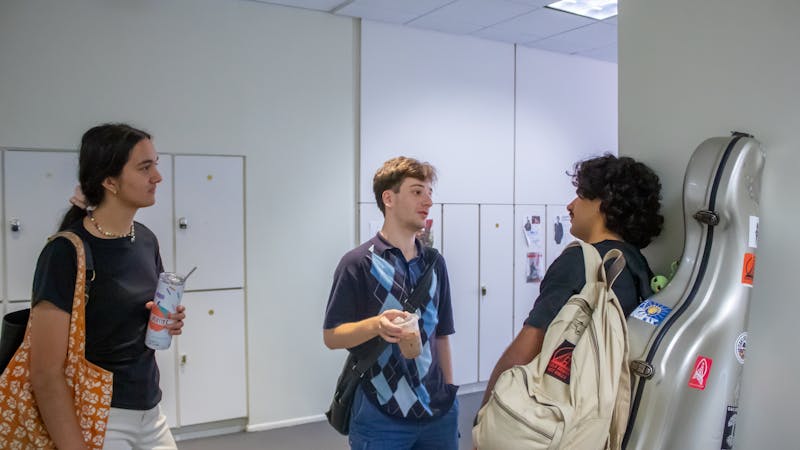CAAAS gets a makeover

One does not have to go further than Rice’s own website to learn about its 1891 charter, which originally designated the school for “the instruction and improvement of the white inhabitants of the City of Houston and State of Texas.” More than 100 years later, Rice has seen a surge in the promotion of diversity, equity and inclusion efforts and Black scholarship, especially in the Center for African and African American Studies.
On Jan. 1, 2024, Sherwin K. Bryant will start as the new director of CAAAS, as well as an associate professor in the Department of History. Currently an associate professor of African American studies at Northwestern University, Bryant received his Ph.D. in history from Ohio State University in 2005 and went on to pursue postdoctoral research projects and fellowships including a Fulbright scholarship in Peru.
Bryant is known for his groundbreaking research on slavery and race in the early modern African Diaspora. His 2014 book “Rivers of Gold, Lives of Bondage: Governing through Slavery in Colonial Quito” advanced the understanding of slavery in the Americas as having significant political importance and was the first English-language examination of slavery in Ecuador and southern Colombia.
Those who have met the new director, like CAAAS student advisory board member Jaylin Vinson, say he is as personable as he is knowledgeable.
“You can definitely tell he’s very passionate about people,” Vinson, a Sid Richardson College junior, said.
Vinson and other student advisory board members had the unique opportunity for a meet-and-greet with Bryant last spring.
“I just remember [how in] our conversation, he was asking a lot of great questions, really trying to get a sense of how I thought of the pulse of the program, and also just [about] being a Black student at Rice,” Vinson said. “I could definitely tell that he had a lot of investment in the future of CAAAS being very integrated and embedded in the perspectives and experiences of current students.”
Bryant said he is excited to take full advantage of the new opportunities in Rice’s up-and-coming Black studies program and to further establish Rice as an epicenter of Black scholarship.
“Rice has a growing group of dynamic scholars situated within the Center for African and African American Studies,” Bryant wrote in an email to the Thresher. “I [am] excited about working with this growing community of scholars to make CAAAS a major research hub addressing Africa and its diaspora across the Americas.”
Bryant’s appointment as the new director CAAAS is one of many recent developments aimed at expanding the center. Founded in 2019, the CAAAS is significantly younger than African and African American studies departments at other schools such as the University of Texas at Austin, which opened its Department of Black History and African American studies in 1968.
In light of recent education limitations and legislation inhibiting DEI efforts at US public institutions, Rice is now able to give resources to programs that other schools may no longer be able to fund. According to Anthony Pinn, the founding director of CAAAS, this puts Rice in a unique position.
“[Public institutions] have to be mindful of the political waves and inclinations in a way that we don’t,” Pinn, an Agnes Cullen Arnold professor of humanities, said, “and so I think that kind of frees us to think differently.”
Rice trustee Terrance Gee and family recently donated $1 million to CAAAS to fund the new Anthony B. Pinn Postdoctoral Fellowship. On Oct. 6, the Task Force on Slavery, Segregation and Racial Injustice released its final report, calling on the university to ensure the “[commitment of] significant resources to the further growth of the Center for African and African American Studies.”
Caleb McDaniel, a co-chair of the task force, said another step would be to designate a physical space on campus to house CAAAS.
“If I asked you right now, where is the Center for African and African American Studies? It would be kind of hard to answer that question, there’s not a clear place for the center,” McDaniel, a Mary Gibbs Jones professor of humanities, said. “I think [it] would represent a real investment by the university to give the center a prominent place on campus that signifies how important this field is, and how much Rice has to contribute to the development of the field.”
For Pinn, what’s left to see now is whether Rice will truly take advantage of all this momentum.
“The question is, is Rice going to maximize its potential or are we going to be risk averse?” Pinn said. “Are we going to really maximize this [and] push ourselves to be better? That has to involve becoming comfortable with discomfort.”
CAAAS gets a makeover
One does not have to go further than Rice’s own website to learn about its 1891 charter, which originally designated the school for “the instruction and improvement of the white inhabitants of the City of Houston and State of Texas.” More than 100 years later, Rice has seen a surge in the promotion of DEI efforts and Black scholarship, especially in the Center for African and African American Studies.
On Jan. 1, 2024, Sherwin K. Bryant will start as the new director of CAAAS, as well as an associate professor in the Department of History. Currently an associate professor of African American studies at Northwestern University, Bryant received his Ph.D. in history from Ohio State University in 2005 and went on to pursue postdoctoral research projects and fellowships including a Fulbright scholarship in Peru.
Bryant is known for his groundbreaking research on slavery and race in the early modern African Diaspora. His 2014 book “Rivers of Gold, Lives of Bondage: Governing through Slavery in Colonial Quito” advanced the understanding of slavery in the Americas as having significant political importance and was the first English-language examination of slavery in Ecuador and southern Colombia.
Those who have met the new director, like CAAAS student advisory board member Jaylin Vinson, say he is as personable as he is knowledgeable.
“You can definitely tell he’s very passionate about people,” Vinson, a Sid Richardson College sophomore, said.
Vinson and other student advisory board members had the unique opportunity for a meet-and-greet with Bryant last spring.
“I just remember [how in] our conversation, he was asking a lot of great questions, really trying to get a sense of how I thought of the pulse of the program, and also just [about] being a Black student at Rice,” Vinson said. “I could definitely tell that he had a lot of investment in the future of CAAAS being very integrated and embedded in the perspectives and experiences of current students.”
Bryant said he is excited to take full advantage of the new opportunities in Rice’s up-and-coming Black studies program and to further establish Rice as an epicenter of Black scholarship.
“Rice has a growing group of dynamic scholars situated within the Center for African and African American Studies,” Bryant wrote in an email to the Thresher. “I [am] excited about working with this growing community of scholars to make CAAAS a major research hub addressing Africa and its diaspora across the Americas.”
Bryant’s appointment as the new director CAAAS is one of many recent developments aimed at expanding the center. Founded in 2019, the CAAAS is significantly younger than African and African American studies departments at other schools such as the University of Texas at Austin, which opened its Department of Black History and African American studies in 1968.
In light of recent education limitations and legislation inhibiting DEI efforts at US public institutions, Rice is now able to give resources to programs that other schools may no longer be able to fund. According to Anthony Pinn, the founding director of CAAAS, this puts Rice in a unique position.
“[Public institutions] have to be mindful of the political waves and inclinations in a way that we don’t,” Pinn, an Agnes Cullen Arnold professor of humanities, said, “and so I think that kind of frees us to think differently.”
Rice trustee Terrance Gee and family recently donated $1 million to CAAAS to fund the new Anthony B. Pinn Postdoctoral Fellowship. On Oct. 6, the Task Force on Slavery, Segregation and Racial Injustice released its final report, calling on the university to ensure the “[commitment of] significant resources to the further growth of the Center for African and African American Studies.”
Caleb McDaniel, a co-chair of the task force, said another step would be to designate a physical space on campus to house CAAAS.
“If I asked you right now, where is the Center for African and African American Studies? It would be kind of hard to answer that question, there’s not a clear place for the center,” McDaniel, a Mary Gibbs Jones professor of humanities, said. “I think [it] would represent a real investment by the university to give the center a prominent place on campus that signifies how important this field is, and how much Rice has to contribute to the development of the field.”
For Pinn, what’s left to see now is whether Rice will truly take advantage of all this momentum.
“The question is, is Rice going to maximize its potential or are we going to be risk averse?” Pinn said. “Are we going to really maximize this [and] push ourselves to be better? That has to involve becoming comfortable with discomfort.”
More from The Rice Thresher

Over 1,000 students petition against new meal plan
When Konstantin Savvon opened the Housing and Dining email announcing the new unlimited meal plan, he was instantly concerned about the impact on off-campus students like himself.

Rice shuttle bus drivers reflect on changes and connections behind the wheel
Martine Stewart has spent the past year behind the wheel of Rice’s greater loop shuttle, circling the inner campus from the early morning to late afternoon. She said she has come to recognize many of her regular riders – not just their faces, but the exact spots where they wait to be picked up.

Music majors at Rice’s Shepherd School tackle busy schedules, future goals
Cirdan Vonnahme began playing the cello at 4 years old. After winning his first competition at 11 and debuting with an orchestra, he realized he wouldn’t mind playing the cello for life.

Please note All comments are eligible for publication by The Rice Thresher.